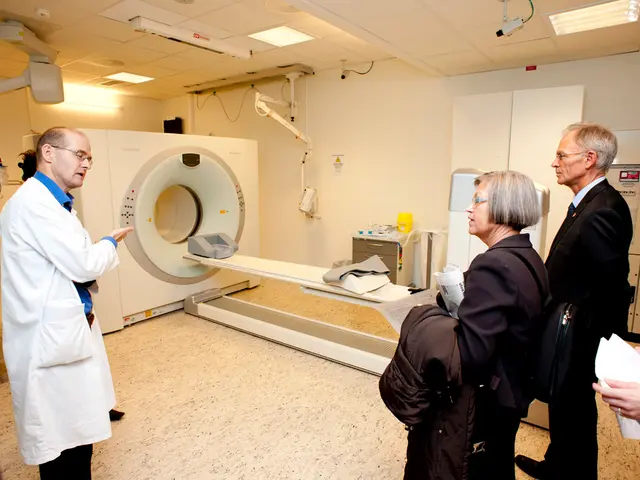Crucial insights into Multiple Sclerosis (MS):
In the complex world of neurological disorders, Multiple Sclerosis (MS) stands out as a significant challenge. This article offers an overview of the symptoms, treatments, and coping strategies for progressive forms of MS, including Primary Progressive MS (PPMS) and Secondary Progressive MS (SPMS).
Progressive MS symptoms involve a gradual worsening of neurological deficits, such as pain, weakness, sensory changes, mobility, and cognitive impairments. Common symptoms in PPMS include pain (headaches, leg/feet pain, muscle spasms), Lhermitte sign (electric shock-like sensations when bending the neck), difficulty walking and balancing, muscle fatigue and weakness, tingling, numbness, shakiness, dizziness, mood swings, depression, cognitive difficulties, sexual dysfunction, vision problems, and bowel and bladder incontinence. SPMS, on the other hand, presents with gradual worsening sensory issues such as numbness and tingling, neuropathic pain affecting face, limbs, or trunk, progressive weakness particularly in upper limbs, walking and coordination difficulties, increased disability over time with cognitive decline, and similar symptoms to PPMS but typically evolving from an earlier relapsing-remitting phase with fewer relapses as the disease progresses.
Regrettably, there is currently no cure for MS. However, treatments aim to slow progression, manage symptoms, and maintain quality of life. Disease-modifying therapies (DMTs), primarily used for relapsing forms, are also employed to slow progression in SPMS, especially if the disease is active. These therapies target immune cells attacking the Central Nervous System to reduce inflammation and new lesions. Symptomatic treatments address specific symptoms such as pain, spasticity, muscle weakness, and bladder/bowel dysfunction using medications, physical therapy, and supportive devices. Acute exacerbations may require high-dose intravenous corticosteroids to reduce inflammation during attacks, although progressive MS often lacks distinct relapses. Palliative and supportive care becomes increasingly important towards advanced stages to address complex disability, cognitive and communication difficulties, and overall comfort.
Management of progressive MS combines pharmacologic treatment with rehabilitation and supportive care to optimize function and quality of life despite irreversible progression in many cases. It's essential to note that the symptoms and progression rate of MS vary from person to person, with some symptoms not being noticeable in the early stages and others impacting quality of life.
Advanced MS can involve paralysis, but most people will not experience this. The National Institute of Neurological Disorders and Stroke (NINDS) suggests that the number of people with MS may be closer to an unknown figure due to difficulty in knowing the exact count. Factors that may increase the risk of developing MS include having a family history of MS, having a history of other autoimmune conditions, having had certain viral infections, smoking, being 20-40 years old, being female, living in a temperate climate away from the equator, and having low vitamin D levels.
Coping with fatigue, which is one of the most debilitating symptoms of MS, is crucial for people with the condition. David Bexfield, who was diagnosed with MS in 2006, started a group called ActiveMSers and advised people with MS to pay attention to their bodies and do what helps them feel good, such as daily exercise.
In the United States, approximately 1 million people have multiple sclerosis (MS), according to the National Multiple Sclerosis Society. MS is believed to be an autoimmune disease that develops when the immune system attacks its own healthy tissues, specifically myelin, the fatty substance that acts as a protective cover to nerve fibers.
In conclusion, understanding the symptoms, treatments, and coping strategies for progressive MS is vital for those affected by the condition and their caregivers. Despite the challenges, it's essential to remember that with the right support and management, people with progressive MS can continue to live fulfilling lives.
- The neurological condition Multiple Sclerosis (MS) is marked by multiple symptoms, including pain, mobility issues, cognitive impairments, and chronic disorders like depression and bladder incontinence.
- Despite the absence of a cure, medical-conditions like MS can be managed through various treatments that aim to slow down progression, alleviate symptoms, and improve quality of life.
- Rehabilitation and supportive care play a crucial role in managing progressive MS, as they help optimize function and wellness, even in the face of irreversible progression.
- The National Institute of Neurological Disorders and Stress suggests that the exact number of people living with MS remains elusive due to difficulties in counting.
- Coping with debilitating symptoms, such as fatigue, is essential for individuals with MS, and seeking support from groups like ActiveMSers can be beneficial.
- Skin care becomes significantly important for people with MS due to the potential development of pressure sores from prolonged immobility, a common complication of the disease.
- The National Multiple Sclerosis Society reports that approximately 1 million people in the United States have multiple sclerosis, an autoimmune disorder that attacks myelin, the protective covering of nerve fibers, leading to chronic neurological disorders.




